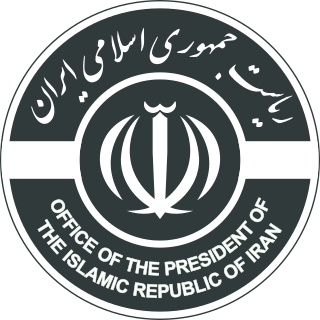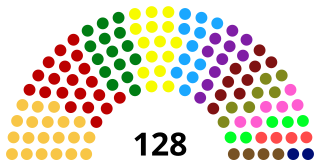Related Research Articles

The politics of Bulgaria take place in a framework of a parliamentary representative democratic republic, whereby the prime minister is the head of government, and of a multi-party system. Executive power is exercised by the government. Legislative power is vested in both the government and the National Assembly. The Judiciary is independent of the executive and the legislature.

The Czech Republic is a unitary parliamentary republic, in which the president is the head of state and the prime minister is the head of government. Executive power is exercised by the Government of the Czech Republic, which reports to the Chamber of Deputies. The legislature is exercised by the Parliament. The Czech Parliament is bicameral: the upper house of the Parliament is the Senate, and the lower house is the Chamber of Deputies. The Senate consists of 81 members who are elected for six years. The Chamber of Deputies consists of 200 members who are elected for four years. The judiciary system is topped by the trio of the Constitutional Court, Supreme Court and Supreme Administrative Court.
Iraq is a federal parliamentary representative democratic republic. It is a multi-party system whereby the executive power is exercised by the Prime Minister of the Council of Ministers as the head of government, the President of Iraq as the head of state, and legislative power is vested in the Council of Representatives.
Lebanon is a parliamentary democratic republic within the overall framework of confessionalism, a form of consociationalism in which the highest offices are proportionately reserved for representatives from certain religious communities. The constitution of Lebanon grants the people the right to change their government. However, from the mid-1970s until the parliamentary elections in 1992, the Lebanese Civil War (1975–1990) precluded the exercise of political rights.

The politics of Mongolia takes place in a framework of a semi-presidential multi-party representative democracy. Executive power is exercised by the prime minister, who is the head of government, and the Cabinet. The president is the head of state, but holds limited authority over the executive branch of the government, unlike full presidential republics like the United States. Legislative power is vested in parliament. The judiciary is independent of the executive and the legislature.
Sri Lanka is a semi-presidential representative democratic republic, whereby the President of Sri Lanka is both head of state and head of government, and it relies on a multi-party system. Executive power is exercised by the President on the advice of the Prime Minister and the Cabinet of Ministers. Legislative power is vested in the Parliament. For decades, the party system was dominated by the socialist Sri Lanka Freedom Party and the conservative United National Party. The Judiciary is independent of the executive and the legislature.

The politics of Fiji take place within the framework of a parliamentary representative democratic republic. Fiji has a multiparty system with the Prime Minister of Fiji as head of government. The executive power is exercised by the government. Legislative power is vested in both the government and the Parliament of Fiji. The judiciary is mostly independent of the executive and the legislature.

The politics of Uganda occurs in an authoritarian context. Since assuming office in 1986 at the end of the Ugandan civil war, Yoweri Museveni has ruled Uganda as an autocrat. Political parties were banned from 1986 to 2006 in the wake of the 2005 Ugandan multi-party referendum which was won by pro-democracy forces. Since 2006, Museveni has used legal means, patronage, and violence to maintain power.

The government of Italy is in the form of a democratic republic, and was established by a constitution in 1948. It consists of legislative, executive, and judicial subdivisions, as well as a Head of State, or President.
Albania is a unitary parliamentary constitutional republic, where the President of Albania is the head of state and the Prime Minister of Albania the head of government in a multi-party system. The executive power is exercised by the Government and the Prime Minister with its Cabinet. Legislative power is vested in the Parliament of Albania. The judiciary is independent of the executive and the legislature. The political system of Albania is laid out in the 1998 constitution. The Parliament adopted the current constitution on 28 November 1998. Historically Albania has had many constitutions. Initially constituted as a monarchy in 1913, Albania became briefly a republic in 1925, and then a authoritarian monarchy in 1928. In 1939 Albania was invaded by Fascist Italian forces, imposing a puppet state, and later occupied by Nazi German forces. Following the partisan liberation from the Nazis in 1944 a provisional government was formed, which by 1946 had transformed into a Communist one-party state. In March 1991 democracy was restored with multi-party elections.

The Government of Bhutan has been a constitutional monarchy since 18 July 2008. The King of Bhutan is the head of state. The executive power is exercised by the Lhengye Zhungtshog, or council of ministers, headed by the Prime Minister. Legislative power is vested in the bicameral Parliament, both the upper house, National Council, and the lower house, National Assembly. A royal edict issued on April 22, 2007 lifted the previous ban on political parties in anticipation of the National Assembly elections in the following year. In 2008, Bhutan adopted its first modern Constitution, codifying the institutions of government and the legal framework for a democratic multi-party system.

The president of Iran is the head of government of the Islamic Republic of Iran. The president is the second highest-ranking official of Iran after the Supreme Leader.

The Lebanese Parliament is the national parliament of the Republic of Lebanon. There are 128 members elected to a four-year term in multi-member constituencies, apportioned among Lebanon's diverse Christian and Muslim denominations but with half of the seats reserved for Christians and half reserved to Muslims per Constitutional Article 24. Lebanon has universal adult suffrage. Its major functions are to elect the President of the republic, to approve the government, and to approve laws and expenditure.

The President of the Lebanese Republic is the head of state of Lebanon. The president is elected by the parliament for a term of six years, which cannot be renewed immediately because they can only be renewed non-consecutively. By convention, the president is always a Maronite Christian who fulfills the same requirements as a candidate for the house of representatives, as per article 49 of the Lebanese constitution.

A constitutional referendum on a number of changes to the constitution was held in Turkey on 12 September 2010. The results showed the majority supported the constitutional amendments, with 58% in favour and 42% against. The changes were aimed at bringing the constitution into compliance with European Union standards. Supporters of Turkish EU membership hope constitutional reform will facilitate the membership process.

A series of rounds in the Lebanese presidential election were held from 23 April 2014 until 31 October 2016. No candidate reached a two-thirds majority vote in the first round, and subsequent rounds failed to gain a quorum. Finally, in the second round of the forty-sixth session held on 31 October 2016, Michel Aoun, a Member of Parliament and formerly a disputed Prime Minister and Acting President in a rival government near the end of the Lebanese Civil War, was elected with 83 votes in Parliament. He took office the same day as the 13th President of Lebanon since independence in 1943.
Benyamin Naeem Habib is a Pakistani born British businessman and politician. He was elected as a Brexit Party Member of the European Parliament (MEP) in the 2019 European parliamentary election. He remained in the role until the United Kingdom's withdrawal from the EU. Habib is the chief executive of First Property Group, a commercial property investment and fund management company.

Kais Saied is a Tunisian politician, jurist and retired law professor currently serving as the 8th President of Tunisia since October 2019. He was president of the Tunisian Association of Constitutional Law from 1995 to 2019.

Between the parliamentary election in October 2021 and October 2022, there was a political crisis in Iraq, with members of the Council of Representatives of Iraq being unable to form a stable coalition government, or elect a new President. Basic government services such as the civil service and military continued functioning, but the national political system was in deadlock including in respect of almost all major spending and taxation issues. On 27 October 2022, the government of Prime Minister Mohammed Shia' Al Sudani was approved by the Council of Representatives.
References
- 1 2 فيصل عفيف الصايغ . Annahar.
- ↑ "Lebanon judicial body rejects four more electoral appeals". Newarab.com. 2022-11-03. Retrieved 2023-07-10.
- ↑ Hasan, Mohammad Ali Al (2022-07-26). "Lebanese Parliament Elected Supreme Council For Prosecuting Presidents And Ministers". 961. Retrieved 2023-07-10.